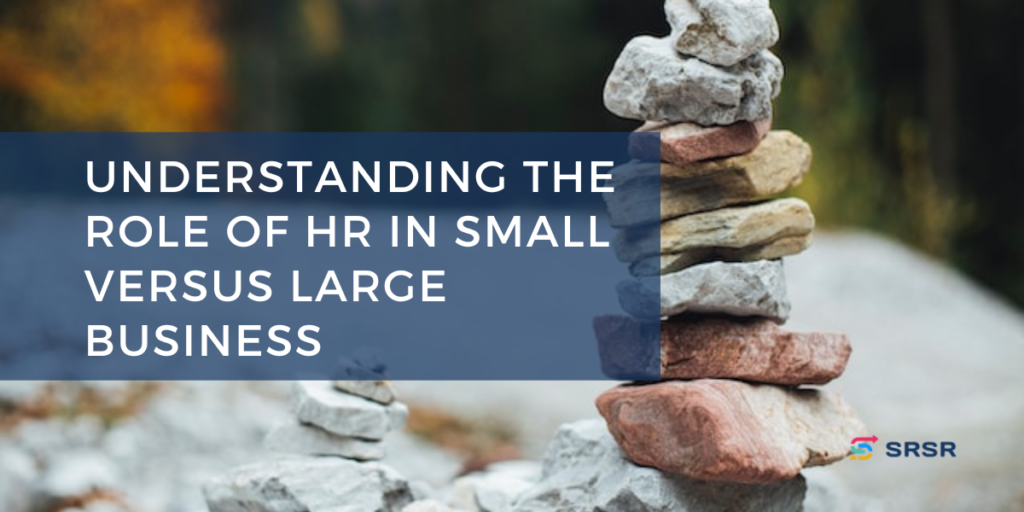Human resources (HR) is the backbone of employment-related administration in small business and as a matter of fact, it is true for all sizes. HR takes care of various responsibilities, such as recruiting, interviewing, and managing benefits. They work behind the scenes for both employees and employers. However, the role of HR in small businesses versus large businesses can be very different.
This article outlines the differences between small business and large business HR and how the same roles can look completely different depending on the company’s size. And if your company is growing, read on to learn more about how you can support your HR staff and avoid burnout.
Differences between HR in small businesses versus large businesses
Even if two people have the same job title, their day-to-day tasks may look completely different. This is true of human resources professionals who work in a large business and those who work in a small business. Here are a few ways these positions may look different depending on the company’s size.
Type of work
Human resource teams handle recruiting, interviewing, onboarding, payroll, employment records, and so much more. And if you’re an HR professional in a small business environment, you may do all of these at once! You may even handle HR issues on a part-time basis while working in a different role for the rest of your time. These professionals handle a wide variety of tasks daily and know a little (or a lot!) about every area of HR.
But at a large business, HR professionals may handle only one aspect of human resources. For example, one person may handle all the benefits administration while another person focuses on recruiting. This type of job specialization allows employees to gain deep knowledge in a single area. Even though they may have knowledge in all areas of HR, they don’t necessarily use all of it regularly.
Resources available
Large businesses have a larger budget for everything, including the HR department. They may be able to invest in HR software or other tools to help their employees work more efficiently and may also invest in additional training and resources for their HR professionals. A larger HR staff can mean more opportunities for mentorship and deeper specialization in certain areas.
Small businesses often operate on a tighter budget. They may not have the resources to invest in professional development and additional training for their HR staff. Additionally, if only one or two HR professionals are on the team, those individuals can become overwhelmed with work during a bump in hiring or a change in benefits. They also may simply not have the time to create things like an employee handbook or write standardized procedures. But HR pros in small businesses have the added benefit of seeing how their decisions impact the company’s financial situation, while in larger businesses it can be more difficult to pinpoint their personal impact.

Work environment
There is a major difference in the work environment between HR in small businesses versus large businesses. Large business HR professionals enjoy camaraderie and workplace mentorship with a larger staff. There are usually several people on the team who are seasoned HR veterans. Newer HR professionals can receive mentorship and guidance as they progress in their careers. However, HR staff might not have the time to build long-lasting relationships with other employees outside of the HR department.
Small businesses usually have only one or two HR professionals, which can lead to feeling isolated from the rest of the employees in the business. Their work may cause them to feel like the “bad guy” as they make sure everyone in the business stays compliant with work-related laws. However, they have the benefit of personally knowing each employee and being able to build relationships to help with employee retention.
Creativity needed
Small HR teams have limited resources, but some HR professionals find this exciting. They get the chance to be creative in making those dollars stretch further. And when they do save the company money or make an excellent hiring decision, they can see how that impacts the company.
In larger companies with established procedures and a large HR staff, it can be difficult to bring creativity to the table. Even if an HR professional has an excellent idea, large companies can be slow-moving as they work to shift procedures or standards and navigate bureaucratic red tape.
Pressure
Every decision a small business makes can have a major impact on the budget. This is especially true for hiring decisions. Hiring a new employee costs an average of $4,000, so if the HR staff makes a mistake in hiring a new employee, those costs can add up quickly. Small businesses can’t afford these types of mistakes, so the HR team in small businesses is under a lot of pressure to make correct decisions.
For larger businesses, HR may be under just as much pressure but for different reasons. Each step of the hiring, interviewing, and onboarding process is well documented, and the HR team needs to follow each one exactly or risk being responsible for a missed background check or other error. And when large companies need to lay off a large part of their staff, delivering this bad news and handling the fallout often falls on the shoulders of the HR team.
Advantages of HR in large versus small businesses
Human resources professionals have important jobs no matter what size company they work for. Working in human resources for a small business or a large business is different, but each size has distinct advantages.
One advantage of working in HR for a smaller business is knowing that your decisions can have a major impact on the company’s budget and the way it runs. HR employees of smaller businesses may be able to make suggestions directly to the CEO when they see something that can be improved. Their valuable input can guide the company as it grows. And since smaller companies are more agile, these changes can be implemented quickly.
Small business HR professionals have a larger variety of tasks to perform, so they have a wide breadth of knowledge. Many HR professionals may prefer working in an environment where they get to use all their knowledge regularly, and working in a small business gives them this opportunity.
HR professionals in larger companies have a team of human resource professionals to work with, giving them the opportunity to grow alongside their team members and learn from others. Typically, they have clear guidance in the form of workplace manuals and set procedures, which can be helpful in getting work done efficiently. They can focus on a certain area of human resources and continue deepening their knowledge in this area. This frees them to focus on one area when laws change and ensures the company stays compliant with these changes. The company doesn’t have to rely on only one or two people to research and understand every change; instead, the responsibility is spread out among many employees, each with their specialization.
How can HR in small businesses adapt to HR in large businesses?
One benefit of growth is that your company can hire more employees to support that growth. But hiring more employees also means relying more heavily on your human resources department.
A job that used to be handled by only one or two people may become unmanageable as more employees are added. But there are several steps you can take to make sure your small business HR department is ready to continue supporting your company’s growth.
Automate as many tasks as possible
Automation can’t do everything, but it can help keep your staff organized and take those mundane, repetitive tasks off their plate. If you haven’t embraced HR software yet, this is an excellent time to look into it. It can do everything from tracking hours and organizing signature forms to posting jobs on job websites. Our HR software guide can help you find software that meets your needs and doesn’t break the budget.
Establish written procedures and best practices

Small companies tend to keep a lot of knowledge in their employee’s heads. It works fine most of the time, but if something happened to your HR employee and they couldn’t come to work anymore, would a new employee be able to jump in and take over? If you need to hire more HR professionals, having written documents outlining what HR is responsible for and how to do those things can help avoid confusion and make sure the entire team handles tasks the same way.
Focus on standardizing the employee experience
How do candidates experience your company? Once a person is hired, what can they expect to happen in the days leading up to their first day? What about their first day on the job? Standardizing the experience for all employees makes sure every employee receives the same information about important details like benefits and company policies. It helps ensure company compliance and makes sure everyone has access to the information they need.
Invest in education
The larger your business becomes, the more difficult it can be to make sure you’re staying compliant. Once your company has over fifty employees, you’ll need to think about complying with laws that your HR staff may have no experience with, such as the Family Medical Leave Act and others.
And even if you haven’t yet reached 50 employees, laws can change, and best practices may need to be updated on an ongoing basis. As an employer, the best way you can ensure your team stays compliant is to invest in their education. Whether that’s sending them to in-person conferences or investing in other types of ongoing training, having knowledgeable employees will work in your favor.
Invest in your team
According to a recent survey, 98% of HR professionals have felt burned out at work in the last six months. Additionally, 71% don’t feel valued in their organization. These are concerning numbers, especially since HR has an invaluable role in company growth. It might not be possible to eliminate burnout, but you can help your HR professionals by making sure they have everything they need to do their job well. This could mean taking non-HR responsibilities off their plate or hiring additional staff to support them.
Final thoughts on HR in small businesses versus large businesses
Your human resources department is the backbone of your company. Their behind-the-scenes work impacts every aspect of your business, and having a reliable, well-trained HR staff is important for businesses of all sizes.
HR software is just one-way businesses can support their staff with automation. If you’re interested in learning about other types of business software, check out our Ultimate Guide for Small Business Software.

